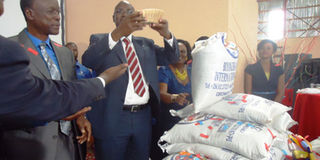New pellet feed, a boon for poultry farming

Bright Rwamirama, state minister for animal industry, at the launch of the new poultry feed product. PHOTO BY FRED MUZAALE
What you need to know:
In poultry farming, feeds contribute a significant cost. This product helps save on cost and time
A new type of feed for broiler chicken that ensures rapid growth and prompt weight gain is on the market. It brings hope to many poultry farmers who are increasingly frustrated by brought about by use of mash feeds.
The pelleted feeds , a product of Biyizinka Poultry International, was launched last week by Bright Rwamirama, the state minister for animal husbandry, at their factory in Mpoma village, Mukono District.
He revealed that government plans to make a law that would punish manufacturers of fake feeds. “This factory is going to lead to professionalism in feed manufacture,” he said.
Less wastage
The event was also used as an opportunity by the company to sensitise farmers on the advantages of the new feed and how to carry out profitable poultry farming. It was attended by farmers from the different parts of the country.
Ms Grace Batte, the company’s marketing manager, said when the pellet feeds are used, it ensures better usage as a farmer needs only 3.5kg to grow a bird, compared to the 7-8kg of broiler’s mash that would be used.
In addition, there is little wastage as the pellet can always be picked up by the bird even if it falls on the floor. Unlike mash, which always spills into the litter and is wasted.
“Each time the chicken eats one pellet, it gets all the nutrients, therefore, a farmer is sure that every chicken that eats will get a complete diet. Because of this, there is no need to add other materials for nutrients,” Batte says. “The feed is also sanitised as the process of making it kills bacteria since the feed goes through steam treatment. Thus, salmonella and other bacteria found in the raw materials are killed.”
Access markets
Because of these benefits, the broilers are ready to sell in four to five weeks and most of them are uniform size since they eat the same diet.
This is in comparison to the eight to nine weeks that broilers are fed on mash need to grow before they are ready to sell.
“On top of saving money, the birds fed on pellet feeds will be of high quality which will help farmers access international markets,” adds Fred Lubanga, the company public relations manager.
The pellet broiler feed is now on sale at outlets in Mukono, Mubende, Iganga, Mbale, Hoima, Mityana, plus Nateete, Container Village and Kansanga in Kampala, as well as Seguku on Entebbe Road.
Optimistic
Monica Kibuuka, a poultry farmer from Luweero District, expressed optimism that the use of pellet feed would reduce the cost of poultry farming.
“I was about to abandon the business because of the high cost of feed that reduced my profits because even the birds were growing slowly,” she said.
While Robert Ssendegeya, another poultry farmer from Mitala Maria, Mpigi District, expressed eagerness to try the new feed to see its effect on indigenous chicken.
“I have been using mash to feed my local chicken but their growth is very slow. I hope this feed will give a boost to my enterprise,” he says.
comparing poultry farmers who use pellet and mash feeds
To show how a farmer, who uses pellet feeds saves money compared to the one who uses mash feeds, Fred Lubanga, public relations manager, Biyizinka Poultry International, gives an example of two poultry farmers each rearing 100 broilers.
One uses pelleted feeds, and the other broilers mash.
Farmer using pelleted feed
The cost of a kilogramme of starter munched feed for chicks is Shs 1,550. With each chick consuming 0.5kg for 12-14 days, this farmer will spend Shs77,500 on 100 birds.
After the two weeks, he/she switches to grower pellet feeds. These cost Shs1,482 per kilo. Each bird will eat 1.5kg for two weeks, so he/she will need 150kg of feed for the 100 birds. So he/she will spend Shs 222,300 for three to four weeks.
When the birds reach five to six weeks, it is time for finisher pellet feeds. Each kilo is Shs1,380. With each bird consuming 1.5kg, it will be 150kg for two weeks. This come to Shs207,000.
When the costs of starter, grower and finisher feeds are added up, it comes to Shs506,800 which this farmer will have spent up to when he/she sells the birds.
Farmer that uses broilers’ mash
The farmer who uses broilers mash to his/her birds will use starter mash, which costs Shs1,200 per kilo. The 100 birds on starter mash for three weeks, will be 250kg. He/she spend Shs252,000. After that, he/she will change to finisher mash that cost Shs1,200 per kilo. To feed the 100 birds for three weeks, he/she will need 350kg, which comes to Shs420,000. In the end, this farmer will have spent Shs672,000.
Total costs
In the final analysis, the one who fed the birds on pellet feeds spent Shs506,800 while the one who used mash spent Shs672,000. The first farmer saved Shs165,200.




